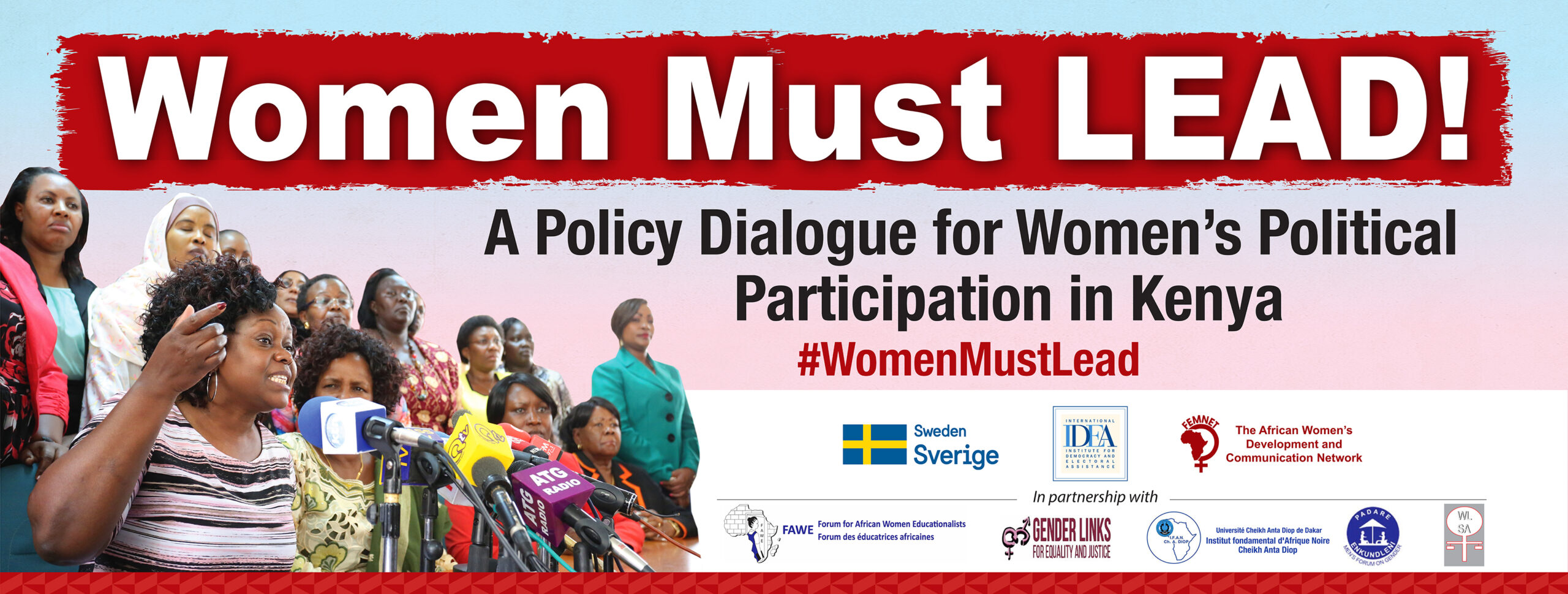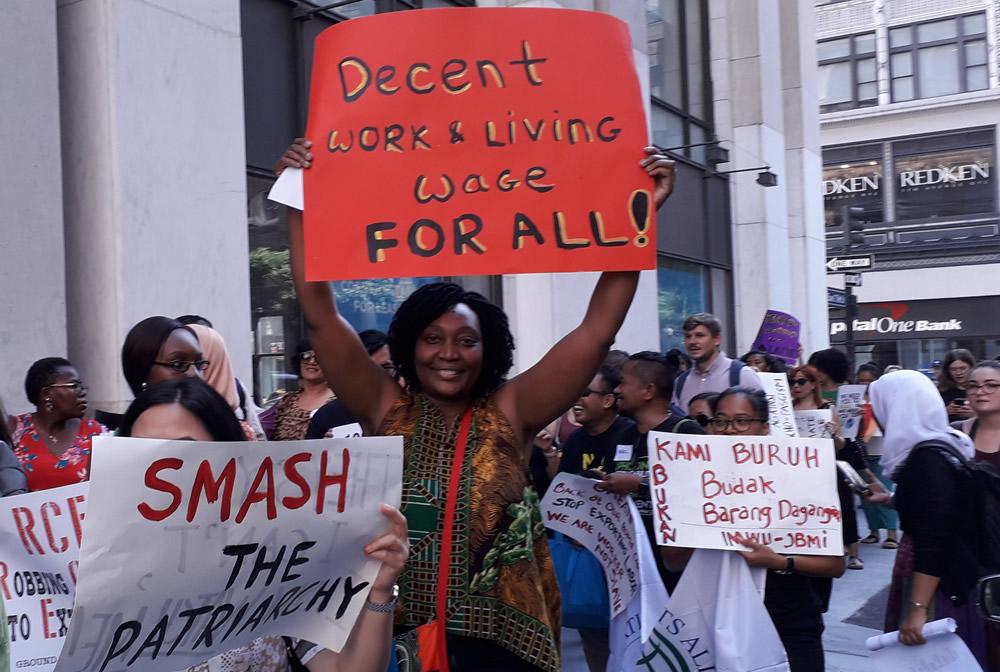Communique – Women's Consultation on the Africa We Want Post 2015
Sunday, 21 October 2012 18:33
Monrovia, Liberia, October 21, 2012
We, the representatives of regional, sub regional, national and grassroots women’s organizations and networks, participating in an Africa Women’s Regional Civil Society Consultation on the 21st and 22nd October 2012 organised by FEMNET, AAWORD, EASSI, WiLDAF- WA, SADC Gender Protocol Alliance, AMwA in partnership with IPPF-ARO, Oxfam and Urgent Action Fund.
Gathered together to reflect on the achievements of the Millennium Development Goals (MDGs), deliberate on the lessons learned, and account for the loss and gains made on women’s rights across Africa in relation to ongoing consultations on the Post-2015 Development Framework
- We recognise that there have been significant advances in the achievement of the MDG’s.
- We are however concerned that little focus has been placed on the qualitative aspects concerning gender equality and women’s rights in the MDGs.
- Furthermore, we assert that critical development factors such as human capabilities, climate change and peace and security have been excluded, and the current framework has failed to effectively address horizontal and vertical inequalities within and across Africa.
We also note that
- Africa is a continent endowed with rich natural resources, mineral wealth and human resources, which if managed well are capable of facilitating equitable and sustainable development for its citizens.
- Africa currently exhibits the highest rates of economic growth and boasts of the youngest population in the world. If harnessed, this coupled with growing uptake of
- information and communication technologies could yield significant progress towards development for all.
- A post 2015 development framework must be grounded in Human and Women’s Rights principles that go beyond economic growth, and must take into account the social and political dynamics that account for both vertical and horizontal structural inequalities.
- We must be alert to shifting global dynamics and put in place structures that will enable transformative global financial and political partnership frameworks that foster Africa’s rightful share of economic growth and development.
- African governments must continue to be the key actors and accountable for driving development and growth.
- Governance, peace and security remain critical to an environment conducive to equitable growth and development.
BREAKTHROUGH PLAN
Recommendations for Accelerating Progress in the Existing MDGs.
We recognize the need to accelerate the implementation and application of the commitments related to gender equality and women empowerment in the MDGs ahead of 2015. To this end, we urge governments, development partners, civil society, the private sector and all relevant stakeholders to prioritize the following:
1. Ensure access to a gender-equitable, free, quality primary education and school environment including increasing the number of female teachers
2. Accelerate implementation of commitments to women’s reproductive health made in the African Union Protocol on the Rights of Women, the Maputo Plan of Action and other regional and international instruments.
3. Prioritize the provision of comprehensive sexual and reproductive health services to ‘marginalized’ groups which include, but is not limited to: women and girl refugees, rural women, immigrants, LGBTI’s, sex workers, widows and women with disabilities.
4. Implement Gender-Based Violence (GBV) policy reforms to ensure zero tolerance of violence against women (VAW) through a transformed security, legislative and health provisioning system.
5. Redress laws on freedom of information and expression including transparency and improved access to information for women.
6. Strengthen and consolidate women’s participation, skills and expertise in all forms of the media and to eliminate media coverage that fosters gender stereotyping and myths.
7. Redress the gaps in women’s employment to ensure equitable income redistribution, land reform, gender and child-responsive budgeting and trade policies.
8. Enhance the inclusion of young women’s participation in governance, job creation opportunities and peace and security processes.
9. Prioritize and include women’s indigenous knowledge as part of the ongoing climate change conversations, including the design and implementation of climate change coping mechanisms, to assist in the development of alternative sustainability mechanisms for both rural and urban women.
10. Commit resources, through government budgetary allocations and domestic mobilization, to eradicate the re-colonization of our extractive industries and land
11. Accelerate women’s economic empowerment through the elimination of barriers to women’s access to credit, skills and markets.
12. Implement gender parity laws in existing regional and international commitments in order to realize equal participation, representation and inclusion of women in decision-making, leadership and governance.
13. Create an enabling environment that is committed to, supports, protects and promotes women’s role and rights in decision making positions, which include participation in peace negotiations and mediation.
14. Ensure government responsibility and accountability on women’s rights, by implementing and fast-tracking laws, as contained in various international and African regional women instruments, for the full enjoyment of these rights, including the elimination of discrimination.
Recommendations for the Post 2015 Development Framework
In recognition of the underlying assumptions inherent in past and current development frameworks including the MDGs, we urge that attention be paid to the following key recommendations as part of the global development agenda setting process:
I. Accessible universal primary education and strengthening of post primary education Address barriers that negate the retention of girls in school which include but are not limited to: gender-based violence, harmful cultural practices, and prohibitive and hidden costs to universal primary education. Prioritize post-primary education, including free secondary education, targeted scholarships and more affordable tertiary education and non-formal education for girls. Invest in educational infrastructure and the building of schools close to communities to ensure the involvement of the community in school management. Plan for flexibility in educational scheduling and make schools girl-friendly by improving the safety of schools, the design of facilities (such as latrines for girls), instituting policies that promote girls’ attendance (such as permitting married adolescents and adolescent mothers to attend), providing gender-sensitive textbooks, and developing a curriculum for girls that is strong in math and sciences and that projects gender equality concepts. Ensure parity between male and female teachers at all levels of education
II. Women’s health and eradicating violence against women Universal access to quality, gender-responsive, holistic health care information, services and commodities for the physical, mental, sexual and reproductive health of women and girls, supported and enforced through legislation, policy and programmes. Cost the interventions needed and strategies required to address violence against women including the building and allocation of shelters and the enforcement of laws. Develop minimum standards to ensure effective, appropriate and sustainable service provision to victims of VAW, across security, correctional and health sectors. Identify the cost of, and provide minimal resources required for the provision of, quality continuum of care services, which include prevention, support and response mechanisms, for victims of violence.
Include indicators on reducing the incidence of unsafe abortions as a means to reducing maternal mortality rates and to mobilise for informed change in policy.
III. Guarantee women’s and girls’ property rights Eliminate discrimination of girls and women under the law: review and reform all national legislation that relates to land and natural resources. Related legislation such as family and marriage laws, equal rights to inheritance and housing law are all important legal areas that play a supporting role in ensuring equitable treatment of men and women in control over land. Empower women to claim their land rights by raising women’s legal literacy, increasing the dissemination and accessibility of information and establishing supportive legal services
IV. Accelerate women’s economic empowerment Design products to strengthen women’s position such as: loans for purchasing land or houses requiring that they be registered in women’s names, loans for businesses that employ women, or for businesses that offer services such as child care that benefit other women. Develop and implement income and social policies that account for: registration/protection of informal work, effective compliance with legislation on minimum wage and anti-discriminatory clauses, state support for smallholder agriculture, and ensure labour is appropriately compensated in a largely globalized economy where its bargaining power has been reduced. Develop and implement social protection programmes to protect against income shocks including due to illness, old age, disasters and market risks. Provide accessible and good quality infrastructure, domestic technology and care services to support women’s production of labour and to reduce the unpaid care work undertaken primarily by women and girls. Improve women’s time burdens through access to labour saving technologies and infrastructure that contribute to the transformation of gender relations and roles at the household level and equal sharing of household responsibilities between women and men, girls and boys. Recognise women as key actors in trade including cross-border trade by strengthening infrastructure, access to information, skills in value additions, linking women to markets and eliminating violence against women at border points
Redistribute wealth/income through, gender- and child-responsive budgeting, adequate corporate taxation, progressive income taxation, and pro-poor fiscal and trade policies. Promote rural economy and development by increasing investment in the agricultural sector, subsidising agricultural and pastoralist inputs for women farmers and bringing quality and affordable services closer to the community
V. Governance, Peace and Security: Re-centre human security as a central pillar and enabler for women’s participation, contribution and leadership in peace building, reconstruction and early warning systems and conflict transformation. Comply with and implement gender sensitive priciples in line with regional policy frameworks such as the African Union’s Security Sector Reform policy framework, reform the security sector, including the integration of gender-sensitivity principles and cross-gender participation. Catalyse women’s participation, representation and leadership in decision making across the public and private sector through the development of special measures and implementing existing commitments to gender parity in women in decision making in public and private sector.
————————————————————————-
End of Communiqué
Signed:
1. 21st Century Women – Liberia
2. African Women’s Development and Communication Network (FEMNET)
3. Akina Mama wa Afrika (AMwA)
4. Angie Brooks International Centre (ABIC) – Liberia
5. Association des Femmes du Medias (AFEM)- Democratic Republic of Congo
6. Association Nationale AL HIDN – Morocco
7. Association of African Women for Research and Development (AAWORD)
8. Eastern Africa Sub Regional Initiative for the Advancement of Women (EASSI)
9. FEMNET Mali
10. Forum for African Women Educationalists (FAWE) – Liberia
11. Gender Links – South Africa
12. Grassroots Organizations Operating Together in Sisterhood GROOTS – Kenya
13. Isis WICCE
14. Liberia Women Media Action Committee (LIWOMAC) / Liberia Women Democracy Radio (LWDR)
15. NGO Gender Coordination Network – Malawi
16. Oxfam
17. Reproductive Health Advocacy Network Africa (RHANA)
18. SADC Gender Protocol Alliance
19. Society for Women and AIDS in Africa (SWAA)
20. Solidarity for African Women’s Rights coalition (SOAWR)
21. Tsharanang Legal Advocacy Centre (TLAC) – South Africa
22. Voice of the Voiceless (VOV) – Liberia
23. Women in Law and Development in Africa – West Africa
24. Women in Peace Building Network (WIPNET)
25. Women of Liberia Peace Network (WOLPNET)
26. Women’s Health Association of Ethiopia
27. Women’s NGO Secretariat of Liberia (WONGOSOL)
28. Young Women’s Christian Association of Liberia (YWCA)
29. Youth for Community Academics & Development Services (YOCADS)
30. Zvishavane Water Project – Zimbabwe
Additional Info
- Release date:Oct 21, 2012
- Contact for publication:advocacy@femnet.or.ke
[download id=”2277″]
Related Tags
Related Posts
“Women Must LEAD! We need feminist leadership in Kenya”
Press Statement For Immediate Release: Nairobi, 29th August 2020 Ten years after the promulgation of the Constitution of
Learn MoreFEMNET urges more commitment to the delivery of the 2030 Agenda for Sustainable Development
New York, 19th July 2019 – The African Women’s Development and Communication Network, FEMNET alongside hundreds of women’s
Learn More

